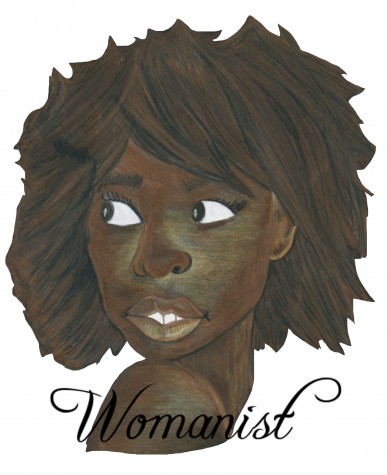Why I’m a womanist
Black women should shine in the spotlight

A womanist consists of more than just being African American and feminist — it’s a label I proudly claim.
The formal definition of womanism is the realization that feminism does not encompass the perspectives of black women. An African American feminist? I thought there was no such thing. What I didn’t know is that womanists are the real deal and I wanted to be one of them.
A story that’s stuck with me from my childhood is when I told my mom I wasn’t pretty because I was black. I went to Park Spanish Immersion, a predominantly white school, so most of my friends were white. One night, my mom and I were talking, and all of a sudden I said, “white girls are beautiful but I’m not because I’m black.”
My mom just stared at me in disbelief. “You are beautiful. Don’t compare yourself to a white girl. You are black and you are beautiful, do you hear me?” she said. That day, I heard my mom loud and clear — even though I had a different skin tone, I was still beautiful and I needed to embrace it.
In today’s society, black women are viewed as ghetto, loud and ratchet, but that’s not every black woman in the world. People tend to judge a book by its cover or, in this case, the color of its skin and gender. I will admit, growing up as an African American has had its challenges, but also being a woman creates even more struggles.
Another situation that comes to mind is when I became the manager for the girls’ hockey team freshman year. When I excitedly told my mom and older sister about the opportunity, they hesitantly said it wasn’t a good idea. They thought I would be portrayed as a slave, since managers do whatever the team wants them to do.
It made me think about my decision to become the manager. Was I solely going to reconsider because my family thought I was going to be a slave? Would I look like a slave to the parents and students at the games?
I didn’t listen to my family and I took the managing job anyway. I don’t regret taking the position. The girls and the coaches treated me like I was one of the players. I see where my family was coming from — there aren’t many black people at hockey games, let alone a black person being a manager, but I wasn’t going to let that stigma stop me.
The team members could have offered the job to one of their friends, but they asked me if I wanted it, proving they didn’t care about my skin color. During the two seasons I was a manager, not once did I feel like I was a slave for the team. The fact that I was able to be a manager displays how far black women have come.
A study from the Center for the Study of Women in Television and Film analyzing the most popular movies in 2013 showed that African American women only represented 14 percent of the female characters in the movies. The chance of a woman of color getting a lead role in a TV show or movie is still exceedingly rare.
However, I see black women like Kerry Washington from “Scandal” and Viola Davis from “How To Get Away With Murder” on TV every Thursday night and I feel empowered because even the woman who created those shows, Shonda Rhimes, is African American. Another actress could have played the same exact role as Davis or Washington, but instead they hired two black women as leads. African American women have come a long way, not only in Hollywood, but in history.
Look at my role model, Oprah Winfrey, for example. She had her talk show for 25 years and once that ended, she got her own network. It amazes me that someone could accomplish all of that in their lifetime and be an African American women at the same time. Thanks to all these wonderful and talented role models, I proudly claim the label womanist. I cherish my ethnicity, my gender and all the goals I plan to achieve.
It’s crucial that women of color begin to show people how special we are. We are not women that just blend into the background — we stand out and shine.
Art by Alyssa LeMay.